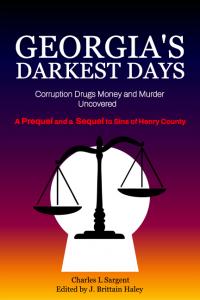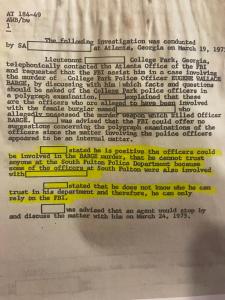
Georgia Author Releases True Crime Books Exploring Cold Cases, Public Records, and Historical Silence

Charles Sargent’s books revisit forgotten Georgia homicides using public records, archived journalism, and community memory.
GA, UNITED STATES, June 17, 2025 /EINPresswire.com/ -- Author and independent researcher Charles Sargent has released two nonfiction books, Georgia’s Darkest Days and The Sins of Henry County, which revisit a series of violent events from the 1970s that were largely forgotten by the public. Based on historical journalism, archived investigative memos, and declassified materials, the books offer a detailed, document-supported narrative of how several deaths were investigated, reported, and remembered.
These works do not draw legal conclusions. Instead, they serve as an effort to preserve the historical record, raise critical questions, and bring attention to voices that have long been absent from public discourse. Sargent’s approach blends true crime storytelling with documentary research, creating a hybrid narrative that is as much about history and memory as it is about crime itself.
“These are stories that were left behind in file cabinets and newspaper clippings,” said Sargent. “I’m not making declarations, I’m connecting what’s already in the public record.”
A Citizen’s Chronicle of Cold Cases and Community Loss
The cases featured in the books occurred over a short span of time in Georgia, involving multiple victims, among them a veteran police officer. One such case is that of Officer Eugene Barge, whose death was part of a string of killings that stunned investigators. In a 1974 article from the Atlanta Journal titled “36 Hours of Death,” journalists described the events as “cold” and “methodical,” noting how even seasoned detectives found them “revolting.”
In Georgia’s Darkest Days, Sargent walks readers through the background of these cases using archived press reports and official documents, focusing on the narrative of how these murders were recorded at the time and what questions still linger decades later. Far from sensationalist, the writing aims to contextualize how institutional reactions, community trauma, and fading memory intersect.
“I believe the questions raised at the time are still relevant now,” said Sargent. “I wanted to bring those voices and records back into focus.”
Drawing from Public Records, Not Headlines
Every element in both books is based on material that is either publicly accessible or drawn from archives through lawful means. That includes historic newspaper articles, internal communications, and FBI memos, such as a March 1975 federal memo in which a Georgia law enforcement official expressed suspicion about internal misconduct and asked the FBI to take over a murder investigation. In that memo, the officer explicitly stated he “could not trust anyone” in his own department and feared that certain colleagues might be involved.
“When I came across documents like that,” Sargent said, “it became clear that this wasn’t just about one case, it was about a culture of silence and fear that affected how these events were handled and remembered.”
Sargent also references letters believed to have circulated among police officials during the time, including a threatening note warning officers to “watch out for your wives.” While he avoids speculation, Sargent presents these primary sources so that readers can interpret them directly.
“These books are built on records that already exist,” said Sargent. “My goal is simply to help people look at them with fresh eyes.”
Research Rooted in Documentation, Not Assumption
Sargent emphasizes that he is not a lawyer, detective, or journalist by trade. His path to research began as a personal interest and evolved into a deep archival dive. Over the course of several years, he gathered court records, interviewed people connected to the victims, and searched through dusty microfilm and physical files at libraries and municipal archives.
“I didn’t go into this with a theory. I went into it with a list of names and dates and let the records tell the story,” he explained.
This method allows The Sins of Henry County to explore institutional dynamics with care. The book is as much about how decisions were made as it is about what happened. In some chapters, Sargent highlights how certain records went missing or how initial investigative leads were suddenly closed without explanation, leaving families with few answers and no closure.
For Readers of True Crime, History, and Institutional Reflection
Both Georgia’s Darkest Days and The Sins of Henry County are available through major online book retailers. They are intended for readers of true crime, investigative nonfiction, and Southern history, particularly those interested in how communities remember (or forget) the violence that shaped them.
Rather than dramatizing tragedy, the books focus on offering a thorough, thoughtful account of the public documents that remain. Sargent invites readers to engage with those documents themselves and form their own understanding of what happened, why it mattered, and how the stories live on.
“I’m not pointing fingers,” he said. “I’m turning over pages.”
A Broader Conversation About Institutional Memory
Sargent’s books also open up discussion about the importance of access to public records and the preservation of historical documents. He hopes the books will inspire students, journalists, and researchers to revisit other forgotten cases in their communities.
“I think we lose something when we only focus on famous crimes,” he said. “There are names and lives in these files that mattered just as much, but didn’t make the headlines. This is a chance to bring them back into the public eye with respect and integrity.”
Upcoming Documentary Collaboration
Mr. Sargent has partnered with Atlanta Video, Inc., Georgia’s oldest media production company, to develop a documentary inspired by his books.
“Audience interest in True Crime content has never been stronger,” said Eddy Von Mueller, award-winning filmmaker and CEO of Atlanta Video. “We’re thrilled to be working with Charles, and we look forward to bringing the revelations contained in Georgia’s Darkest Days and The Sins of Henry County to an even wider audience.”
The documentary team is targeting a mid-2026 release, with a feature-length scripted adaptation also in the works.
Author and Researcher Charles Sargent
Charles Sargent is an Atlanta-based author with a background in independent research and investigative nonfiction. He has spent years reviewing public records, case files, news archives, and personal testimonies to create written works that preserve historical memory and amplify overlooked voices. His goal is not to pass judgment, but to promote transparency and honor the lives behind the headlines.
Charles Sargent
Georgia’s Darkest Days
+ 1 470-696-6427
email us here
Visit us on social media:
Facebook
Distribution channels: Book Publishing Industry, Culture, Society & Lifestyle, Human Rights, Law, Media, Advertising & PR
Legal Disclaimer:
EIN Presswire provides this news content "as is" without warranty of any kind. We do not accept any responsibility or liability for the accuracy, content, images, videos, licenses, completeness, legality, or reliability of the information contained in this article. If you have any complaints or copyright issues related to this article, kindly contact the author above.
Submit your press release

